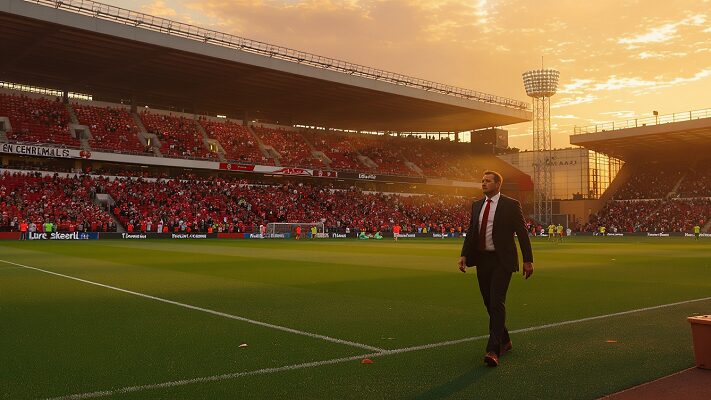Who’s the Next Manager to Be Sacked? Pereira Sacking Opens Up Market
In football, very few things are as scrutinised, feared – or as inevitable for some – as being the next manager to face the sack.
Every early-season slip-up, every sequence of losses, every meltdown at home feeds the speculation.
In the Premier League, where relegation and Champions League money hang in the balance, managerial survival isn’t just about tactics; it’s about patience, expectations, loyalties – and, crucially, results.
In this deep-dive, we’ll break down the numbers, analyse the betting angles, and uncover where the true value might lie in the next manager to be sacked market.
We’ll look at recent results, fan sentiment, fixture difficulty and boardroom politics — all key ingredients in predicting who’s next for the chop.
So, if you’re wondering which Premier League boss is walking the tightrope (and whether the odds truly reflect reality), keep reading — because this is where football strategy meets betting insight.
Who’s Already Gone
The next manager to be sacked odds might be forward-looking, but the early part of the 2025/26 season has already seen some managerial casualties in the Premier League.
Below is a roundup of who’s been dismissed so far — and what it says about how short the leash has gotten.
Premier League Sackings in 2025/26 Season
- Nuno Espírito Santo (Nottingham Forest) — Sacked on 9 September 2025, just three matches into the new season, after a breakdown in relations with the club’s hierarchy over summer transfers and communication.
- Graham Potter (West Ham United) — Dismissed on 27 September 2025 following a poor start, with West Ham languishing in 19th place after only one win in its first five league games.
- Ange Postecoglou (Nottingham Forest) — Sacked on 18 October 2025, a day after another winless performance capped a bleak opening spell marked by defensive frailty and fan unrest.
- Vítor Pereira (Wolverhampton Wanderers) — Sacked on 2nd November 2025, after a 3-0 defeat to Fulham. His Wolves side sat bottom of the Premier League without a win, and a heavy away defeat sealed his fate.
These early exits underscore how unforgiving the margins are. Even managers with time on their side sometimes find no reprieve when results aren’t forthcoming.
In a Sky Sports analysis, the average tenure for departing managers was estimated at 477 days in recent reporting.
Put simply: managers now often operate on a timeline measured in months, not years.
That makes every match critical, and even moderately bad runs can quickly escalate into sack speculation.
The Shortlist: Who’s at Risk

The next manager to be sacked market is always volatile and so it is proving once again!
Just two weeks ago Ruben Amorim was favourite, but victories over Liverpool and Brighton have seen his odds drift out considerably from around 2/1 to 16/1, whilst the sacking of Vítor Pereira has opened up the market.
And incredibly, a poor run of form for Liverpool has seen Arne Slot enter the frame at odds of around 10/1, after starting the season at odds of 100/1 and recently being over the 50/1 mark!
It would seem unthinkable for FSG to sack the manager who brought them the Premier League title last season and who they backed with over £300m in the latest transfer window. If results continue in their current vein however, then it may become a serious possibility.
No doubt the odds will continue to shift dramatically as events unfold, but here are the odds for the next manager to be sacked and how they compare to the odds at the start of the season:
| Manager (Club) | Odds at Start 2025–26 | Current Odds* |
|---|---|---|
| Daniel Farke (Leeds) | 4/1–6/1 | 4/1–7/1 |
| Sean Dyche (Notts Forest) | n/a | 5/1–10/1 |
| Nuno Espirito Santo (West Ham) | n/a | 5/1–10/1 |
| Arne Slot (Liverpool) | 66/1–100/1 | 10/1–16/1 |
| Rúben Amorim (Man Utd) | 16/1 | 16/1–20/1 |
| Enzo Maresca (Chelsea) | 20/1–33/1 | 20/1–33/1 |
| Unai Emery (Aston Villa) | 33/1–40/1 | 16/1–25/1 |
*Odds referred to in the table above and throughout this article are subject to change. Please check your bookmaker for the latest prices.
Let’s now take a closer look at the managers currently under the microscope and see who’s most at risk of becoming the next casualty.
Daniel Farke (Leeds): Odds 5.0 – 8.0

- Date Appointed: July 2023
- Managerial Honours: 2× EFL Championship Titles (with Norwich City)
- Odds at Start of 2025–26 Season: Between 4/1 (5.0) and – 6/1 (7.0)
- Current Odds: 5/1 (6.0) – 7/1 (8.0)
- Key Signings: Dominic Calvert-Lewin (Everton, free), Jaka Bijol (Udinese, €18m), Sean Longstaff (Newcastle, €14m), Anton Stach (Hoffenheim, €20m), Gabriel Gudmundsson (Lille, €11.6m)
Recent form & mood
Leeds have shown patches of promise but also fragile defensive performances.
In a recent Premier League match, Tottenham ended Leeds’s long undefeated home streak with a 2–1 victory — Leeds dominated many metrics but couldn’t finish or prevent a late winner.
There is confidence within the club about the new players and the direction, especially given a busy summer window.
But fan patience is cautious — Leeds has had ups and downs in managerial stability before, and the jump from Championship to Premier League is proving True.
Tactical picture
Farke often tries to maintain structure and defensive shape, while encouraging progression from midfield and full-backs when opportunities arise.
The challenge in the Premier League is the speed of transitions: Leeds can be vulnerable to fast breaks or second-phase attacks if control is lost.
Their recent defeat to Tottenham illustrated they can dominate chances but fail in finishing or protection.
Fan sentiment & board tolerance
There’s cautious optimism that Farke can anchor Leeds in the top flight, but expectations are measured.
The owners and community seem united in wanting stability, not knee-jerk reactions.
If the team starts showing consistent progress (even with mixed results), that buffer may protect him longer. But if results unravel, calls for change will mount.
What it means for the sack-race market
Farke is not among the shortest odds in the sack race, but he’s not immune.
The risk is that if Leeds lose a cluster of matches — especially against direct survival rivals — his odds will shorten.
However, his reputation, recruitment activity, and measured approach give him more buffer than many. If things click, he might moderate his exposure in the next manager to be sacked odds market.
Daniel Farke is an experienced campaigner and knows exactly how brutal the Premier League can be.
His odds of around 4/1 in the next manager to be sacked odds suggest he can’t afford complacency.
Nuno Espirito Santo – 6.0 – 10.0

- Date Appointed: 2 October 2025
- Managerial Honours: Portuguese Primeira Liga (Porto), English Championship (Wolves)
- Odds at Start of 2025–26 Season: N/A (appointed in October 2025)
- Current Odds: Between 5/1 (6.0) and 9/1 (10.0)
- Key Signings: Yet to make any transfers (appointed after summer window closed)
Recent form & mood
Nuno Espírito Santo’s return to Premier League management with West Ham United came just weeks after his departure from Nottingham Forest, marking one of the more dramatic managerial comebacks in recent years.
Brought in to steady the ship after Graham Potter’s dismissal, Nuno inherits a talented but underperforming squad sitting perilously close to the relegation zone.
His first games have offered a glimpse of stability — improved structure, compactness, and visible defensive organisation — but attacking output remains thin.
West Ham fans have greeted his appointment with mixed feelings: some see him as a safe pair of hands capable of shoring things up, others as a pragmatic stopgap unlikely to reignite their European ambitions.
The early signs are positive defensively, yet the challenge remains to turn draws into wins — and fast — given the competitive bottom half of the table.
Integration & balance
Nuno’s immediate priority has been tightening the defensive shape. He’s reverted to his trusted 5-2-3/3-4-3 hybrid system, aiming to give West Ham’s full-backs and wing-backs clear lanes while compacting the middle third.
Early tweaks include dropping the defensive line slightly to protect against transitions, reintroducing Tomas Souček and Edson Álvarez as double pivots, and giving Jarrod Bowen more license to counter into space.
The result? Greater control out of possession — but a noticeable drop in attacking fluidity. Michail Antonio has struggled for service, and creative influence from midfield has been patchy.
Chemistry remains a work in progress, and Nuno’s tactical rigidity could become a talking point if results plateau without progress in open play.
Tactical picture
Nuno has stuck close to the blueprint that served him well at Wolves — disciplined lines, compact spacing, and calculated risk-taking in attack.
The side often morphs between a 3-4-3 in possession and a 5-4-1 defensively, relying heavily on transitional moments to catch opponents off guard.
Bowen and Kudus provide the vertical thrust, while Paquetá drops deeper to link play and dictate tempo.
The trade-off is creativity: West Ham can look cautious and predictable when chasing games, a weakness that cost Nuno during his final months at Spurs and Forest.
If the system clicks, however, West Ham could become one of the most stubborn low-block teams in the division — capable of frustrating stronger opponents and grinding results.
Fan sentiment & board tolerance
West Ham’s fanbase is divided but cautiously supportive. After the turmoil of the Potter era, many appreciate Nuno’s emphasis on structure and accountability.
That said, patience will be thin if performances stay dour or results stall.
The West Ham board, led by David Sullivan, has developed a reputation for pulling the trigger quickly in recent seasons — meaning Nuno won’t have a long honeymoon period.
If results over the next six games don’t lift the club out of the lower reaches, his name could start drifting back towards the top of the sack-race markets.
On the plus side, his experience managing difficult Premier League dressing rooms could serve him well here.
What it means for the sack-race market
Bull case: West Ham become hard to beat, rediscover the defensive solidity of Nuno’s best Wolves sides, and start climbing toward mid-table. Clean sheets calm nerves, the fanbase steadies, and his price lengthens toward 25/1.
Bear case: The pragmatic setup fails to deliver results, goals dry up, and the crowd turns against the cautious style. With a historically impatient board, Nuno could quickly reappear among the sack favourites by Christmas.
Right now, the market is giving him breathing room — but not much. His odds between 6.0 and 10.0 place him in the “watch list” category: not in immediate peril, but vulnerable if the next month doesn’t bring points.
For punters, he represents a classic medium-risk sack-race candidate — the kind who looks safe one week and under fire the next.
Rúben Amorim (Manchester United): Odds 11.0 – 17.0
- Date Appointed: November 2024
- Managerial Honours: Portuguese Primeira Liga x3, Portuguese League Cup x2 (with Sporting Lisbon), Portuguese League Cup (Braga)
- Odds at Start of 2025–26 Season: 16/1
- Current Odds: Between 10/1 (11.0) and 16/1 (17.0)
- Key Signings: Patrick Dorgu (€30m from Lecce), Matheus Cunha (£62.5m, Wolves), Bryan Mbeumo (£71m, Brentford), Benjamin Šeško (€85m, RB Leipzig).
Recent form & mood
A drifter in the next manager to be sacked market is Rúben Amorim, priced at around 16/1 currently.
Life at Manchester United is never easy, and Amorim is finding out the hard way.
In terms of signings, United backed Amorim heavily over the Summer to rebuild the attack and add athleticism and dynamism across the pitch.
So far this season United have been streaky: signs of a clearer identity but not yet week-to-week consistency. Sack-race pieces have him among the shorter prices (second-favourite behind Postecoglou in some lists), reflecting the Old Trafford microscope when performances dip.
Integration & balance
Amorim’s attack was rebuilt on pace, pressing, and penalty-box presence: Cunha as a linking, high-work-rate forward; Mbeumo as a direct, Premier-League-ready wide outlet; Šeško as the vertical 9 to attack crosses and near-post space.
Dorgu provides an athletic, progressive LB to enable back-three morphs in build-up; Lammens brings aerial reach and proactive sweeping for a higher line.
On paper, the profiles fit the game model; in practice, chemistry and availability have been the swing factors as United chase continuity.
Tactical picture
The default is a 3-4-2-1/3-2-5 in possession: centre-backs spread, one pivot holds, wing-backs advance, and the two “tens” work half-spaces.
The press triggers from the front (Cunha/Šeško), with Mbeumo collapsing lanes to force long clearances.
When it hums, United trap opponents and create cut-back chances; when the distances stretch, the back line becomes vulnerable to direct balls and second phases.
Fan sentiment & board tolerance
Supporters have welcomed clearer principles and marquee arrivals, but expectancy rises with the spend.
If results wobble—especially at home—noise grows fast. Ownership has backed this project financially; that buys Amorim time, but not unlimited patience.
What it means for the sack-race market
- Bull case: The squad build finally gels (Šeško finishing, Mbeumo fit, Cunha link), Lammens shores late-game chaos, and metrics tick up — odds lengthen.
- Bear case: Injuries or attacking misfires pull United back into one-goal games; pressure at Old Trafford shortens his price again.
At Old Trafford, expectations are sky-high. A club of United’s stature is judged on Champions League qualification and, ideally, a tilt at the title.
When performances don’t match that standard, the criticism comes thick and fast from pundits, fans, and former players alike.
Amorim is also facing tactical questions, with supporters unsure whether his style suits the squad at his disposal.
United’s fixture list doesn’t do him many favours either. They’ve got a run of tricky away games on the horizon, and if results don’t pick up soon, Amorim could find himself under unbearable pressure.
For now, he’s not as close to the exit door as some others, but he’s still in a precarious position.
💡 Pro Tip: Get Ahead of the Market
One smart betting strategy with the next manager to be sacked market is to look closely at each club’s upcoming fixture list. A tough run of games against top opposition can dramatically shorten a manager’s odds if results go badly.
By identifying managers facing tricky schedules early, you can often back them at longer prices before the market reacts. When pressure mounts after a string of defeats, those odds can tumble fast, giving you a valuable edge over the crowd.
Enzo Maresca (Chelsea): Odds 20.0 – 34.0

- Date Appointed: 1 July 2024
- Managerial Honours: EFL Championship Title with Leicester City (2023–24), UEFA Conference League Winner with Chelsea (2024–25), FIFA Club World Cup, Chelsea (2025)
- Odds at Start of 2025–26 Season: 20/1 (21.0) – 33-1 (34.0)
- Current Odds: 20/1 (21.0) – 33/1 (34.0)
- Key Signings: João Pedro (≈ €63.7m from Brighton), Jamie Gittens (€56m Dortmund), Alejandro Garnacho (€46m Man Utd), Pedro Neto (€60m Wolves)
Recent form & mood
Maresca’s early days were promising: a 6–2 win over Wolves, a string of wins, and a strong opening to entice optimism.
But as the season has progressed, inconsistency, discipline issues, and tactical teething problems have emerged.
Chelsea have been hit by multiple red cards in recent matches, exacerbating pressure on the squad and formation stability.
The scrutiny at Chelsea is intense, and supporters expect upward momentum quickly.
Maresca’s long contract gives security, but clubs with Chelsea’s stature rarely let form slide long before demands intensify.
Tactical picture
Maresca favours a positional style (often in a 4-2-3-1) with fluid attacking transitions, positional interchanges, and building from the back.
The balance lies in protecting against counter-attacks, managing defensive transitions, and maintaining discipline—areas where Chelsea have recently been shaky with late concessions and red cards.
Fan sentiment & board tolerance
Chelsea’s hierarchy has shown willingness to commit long term (the five-year deal) and likely view Maresca as part of a plan rather than stopgap.
However, fans are unforgiving: if the team drifts into mid-table mediocrity or fails to compete in Europe, the expectations will shift fast.
Critics have already flagged that poor discipline and occasional tactical mismatches could be his undoing.
Fixtures & jeopardy (next period)
Upcoming games against top opposition, especially in the Champions League or domestic cup, will serve as litmus tests.
Poor results in key matches will accelerate speculation; strong performances will strengthen his case for continuity.
What it means for the sack-race market
Maresca has both advantages and vulnerabilities:
- Advantages: long deal, clear vision, bold signings, initial momentum.
- Vulnerabilities: inconsistency, discipline, impatience in Chelsea culture.
If he strings together results and solid defensive displays, his odds in the next manager to be sacked market could drift longer.
But given Chelsea’s history of swift managerial changes under pressure, his margin is not infinite — one bad run might be enough to re-ignite calls for change.
💡 Pro Tip: Study the Board’s History
When analysing the next manager to be sacked market, don’t just focus on form or recent results — it’s equally important to look at the owner and board’s track record with managers. Some clubs have a reputation for pulling the trigger quickly, while others are far more patient even during bad runs.
By identifying clubs with a history of frequent sackings, you can often find value in longer-odds managers who may seem safe now but could be at risk if results dip suddenly.
Understanding ownership behaviour helps you stay one step ahead of the market — and spot danger before everyone else does.
Unai Emery (Aston Villa): Odds 17.0 – 26.0

- Appointed: 24 October 2022 (replaced Steven Gerrard)
- Managerial Honours: UEFA Europa League winner x4 (with Sevilla, 2013-14, 2014-15, 2015-16 & with Villarreal, 2020-21), Ligue 1 (2017-18), French Cup x2, French League Cup x2, (all with PSG)
- Odds at Start of 2025–26 Season: 33/1 (34.0) – 40/1 (41.0)
- Current Odds: 16/1 (17.0) – 25/1 (26.0)
- Key Signings: Evann Guessand (€30m from Nice), Amadou Onana (€59m, Everton), Moussa Diaby (Leverkusen, €33m), Pau Torres (€33m, Villarreal)
Recent Form & Mood
Aston Villa have had a mixed start to 2025-26 under Emery. They ended a goal drought with a 1–1 draw vs Sunderland (despite being 10 vs 11 for part of the game).
In contrast, they claimed a 2–1 win over Burnley with a brace from Donyell Malen, marking an encouraging run: four straight victories across all competitions.
However, pressure remains. The team has had costly lapses, defensive fragility, and games where expectations were higher than the output.
Emery has publicly criticised player performances after draws or dropped points, underlining that his patience has limits.
Given Villa’s upward trajectory under him in prior seasons, some fans and pundits are more forgiving; but slip too long without consistency and the narrative will shift.
Tactical Picture
Emery has built Villa into a side capable of stability and attacking balance.
His default setups often emphasize solidity at the back, control in midfield, and structured transitions. But when his teams misstep, errors tend to stem from overconfidence in transition coverage or lack of concentration in the final third.
His tactical acumen is a strength — he knows how to set up sides to roll over weaker teams, get the most out of pressing structures, and manage big games.
But as expectations increase, opponents start targeting weaknesses (such as vulnerability in wide transitions or late lapses). Villa under Emery also show good home form, historically strong under his tenure.
Fan Sentiment & Board Tolerance
Emery is relatively safe compared to many — his long deal (until 2029) suggests the board trusts him and wants continuity.
The club has publicly defended his project, especially after achieving Champions League qualification.
Fans appreciate his upgrades in squad, European ambitions, and more consistent identity. But impatience exists: when the team drops points in games they’re expected to win—or fails to build momentum—critics grow louder. Because the narrative under Emery has been of progress, patience is longer, but not indefinite.
Fixtures & Jeopardy (Next Period)
Villa’s upcoming run is important. A string of matches against mid-table or struggling teams is their chance to consolidate points.
Matches in Europe or against top opposition will test the side’s mental edge and squad depth.
If results don’t follow, questions will accumulate on consistency, rotation, and whether Emery’s methods are fully accepted by the squad.
What It Means for the Sack-Race Market
Unai Emery is not a frontline candidate in the next manager to be sacked odds right now — his performance, contract security, and club backing all insulate him. But no manager is untouchable.
If Villa endure a long winless run, lose control of their narrative or confidence, or if their marquee signings fail to pay off, his odds would shorten.
In effect, he’s a “safe name” for now — one of the last managers people would expect to go prematurely. But if the results spiral and momentum is lost, that safety can evaporate quickly.
Other Contenders – The Longshots

While the spotlight has been firmly on those in immediate danger, a few high-profile names further down the list—such as Pep Guardiola and Oliver Glasner—also feature in the next manager to be sacked odds, albeit at much longer prices.
These managers aren’t under serious threat yet, but shifts in form or dressing-room dynamics could always alter the picture.
Keith Andrews – Odds 25/1
Keith Andrews sits mid-table in the next manager to be sacked odds market, at 25/1.
Unlike the likes of Pep Guardiola, Andrews doesn’t have the weight of multiple trophies behind him, but his situation is different. At his club, expectations are lower, and the board seem inclined to give him time to develop a project.
Results have been mixed, but supporters haven’t turned against him, and that gives him some breathing room.
With less pressure from the media and ownership, Andrews has space to build a system and grow into the role.
The real risk would be if his side slid towards the bottom three and panic set in. For now, though, he looks relatively safe, and the betting odds reflect that stability.
Oliver Glasner – Odds 33/1
Oliver Glasner is another manager who looks relatively comfortable in the next manager to be sacked odds, priced at 33/1.
His team have shown flashes of quality and a resilience that suggests they won’t be in serious trouble this season.
Glasner has also managed to win over large sections of the fanbase with his calm demeanour and clear tactical plan.
Supporters feel there’s a sense of progress, and that often counts for a lot when results wobble.
Even after defeats, the mood hasn’t turned poisonous, which is always a good sign for a manager’s job security.
The danger for Glasner would come if the team went on a long losing streak or collapsed defensively. But with some winnable fixtures coming up, he has a chance to consolidate and keep his side clear of danger.
Unless things go dramatically wrong, Glasner seems likely to keep his job for the foreseeable future.
Pep Guardiola – Odds 40/1
Pep Guardiola’s inclusion in the next manager to be sacked odds market almost feels like a formality.
At 40/1, he’s one of the least likely managers to be sacked in the Premier League. His record speaks for itself: multiple league titles, domestic cups, and a Champions League triumph.
The only scenarios where Guardiola might leave Manchester City are either by his own choice — if he feels he’s achieved everything or wants a new challenge — or in the case of a complete collapse in form. Even then, the board would likely back him over the players.
Fans remain firmly behind him, and the squad is still one of the strongest in Europe. In truth, his job security is about as strong as it gets.
While he appears in the betting market, the odds reflect that a sacking is virtually unthinkable.
Analysis: What the Odds Tell Us
The latest next manager to be sacked odds paint a vivid picture of just how brutal life in Premier League dugouts has become.
Two managers — Nuno Espírito Santo and Graham Potter — have already lost their jobs before October, setting the tone for another season of high turnover and sky-high expectations.
A poor start, even over five or six matches, can quickly escalate into crisis mode, particularly when fans turn or when expensive summer signings aren’t delivering.
This context explains why the sack-race markets move so quickly. Odds of 20/1 in August can crash to 2/1 or shorter within a fortnight of poor results.
Take Ange Postecoglou as an example — when he arrived at Nottingham Forest in early September, his price to be the next Premier League manager sacked hovered around 9.0 to 20.0.
Just a month later, after a winless start and fan unrest, he’s odds-on favourite at 1.44, showing how ruthlessly sentiment and momentum drive the market.
Meanwhile, managers such as Rúben Amorim at Manchester United and Vítor Pereira at Wolves illustrate the middle ground — not in immediate peril, but only a few bad results away from the headlines turning.
Amorim’s ambitious rebuild at Old Trafford is backed financially but scrutinised weekly. Pereira, despite a new contract, finds himself winless and edging toward the danger zone.
🔍 Key Takeaways: What the Odds Tell Us
- Two managers gone already: Nuno Espírito Santo (Nottingham Forest) and Graham Potter (West Ham) were both sacked before October.
- Average tenure is short: Departing Premier League managers average ~477 days in the job — barely more than a season.
- Odds can tumble fast: Ange Postecoglou fell from about 9.0–20.0 at appointment to around 1.44 after a winless start.
- Under the microscope: Rúben Amorim and Vítor Pereira face growing scrutiny; Enzo Maresca and Unai Emery look safer (for now).
- Longshots stay long: Pep Guardiola (~40/1) and Oliver Glasner (~33/1) feature in markets but aren’t close to the chop.
- Bottom line: With huge financial stakes and impatient boards, one bad month can flip any manager’s outlook.
Final Thoughts: The Ever-Spinning Sack Race

The next manager to be sacked odds tell the story of a Premier League that never stands still.
Two bosses have already been shown the door, and several more are walking the tightrope as pressure mounts from fans, boards, and the media alike.
Ange Postecoglou’s struggles at Forest and Rúben Amorim’s inconsistent start at Manchester United highlight just how fragile managerial life has become — even the most decorated names are never far from the rumour mill.
Whether you’re following the market for betting insight or pure drama, one thing is clear: in today’s Premier League, job security is an illusion.
A few bad results can flip the script overnight, and the sack race is now as much a part of the spectacle as the football itself.





Leave a Reply
Want to join the discussion?Feel free to contribute!